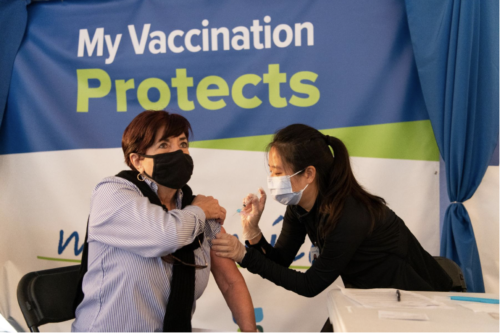It’s difficult when memory loss causes changes in a person you know and love and watching a loved one struggle with Alzheimer’s disease can be upsetting. Dementia and Alzheimer’s disease are progressive forms of memory loss and cognitive impairment that have no cure. However, you can support your loved one and help improve their quality of life as their caregiver.
While being a caregiver can be a rewarding experience, learning how to cope with this new set of responsibilities can feel overwhelming. You may find it hard to focus on yourself, but taking care of your own physical, mental and spiritual needs is vital for both you and your loved one. You don’t have to go it alone, though. Find caregiver support and resources from other caregivers and the compassionate team at the AdventHealth Neuroscience Institute.
We invite you to join us for a caregiver’s conference on Thursday, November 14, at the Center for Health & Wellbeing in Winter Park, as part of our Maturing Minds Program. Come learn how to better care for your loved one with Alzheimer’s and fellowship with other caregivers in the community. Register today or call 407-303-9645 with questions.
Embracing Your Role of Caregiver
As you provide care, remember that your family member is experiencing a loss. It may be difficult but talking about the disease and what to expect can help ease anxiety and fears of the unknown.
A daily routine also helps reduce stress by setting shared expectations. Try to incorporate activities that both of you enjoy and find special moments to connect and cherish one another’s company.
Financial and legal matters may also be hard to discuss but are essential to address before memory loss becomes severe. Having a financial planner or lawyer present may help with these conversations.
Prioritizing Your Health
It’s easy to put your own physical, mental and spiritual needs on the backburner when caring for someone with Alzheimer’s. Remember that taking care of yourself will give you the strength, stamina and patience you need to support your loved one.
Keep a few simple tips in mind to make your health a priority. These are easy to incorporate into your day without sacrificing time or energy away from your family member or friend.
Be Gentle With Yourself
No one is asking you to be perfect, and no one expects it. Remember to be gentle with yourself, especially if you feel like you were impatient at times or unable to provide the care you hoped. Remind yourself that tomorrow is a new day and accept that some days will be more difficult than others.
Eat Healthfully
A diet that features whole grains, fruits, vegetables and lean protein can give you the energy you need to care for someone else. Vitamins and minerals in nutrient-rich foods give your body the sustenance it needs to stay healthy, cope with stress and boost your whole health.
Get Enough Sleep
Stress and anxiety can make anyone toss and turn at night. If you’re finding it hard to fall and stay asleep, try establishing a healthy nighttime routine. Stop drinking caffeine after lunch, limit alcohol intake and eat a healthy meal to sleep better. Take a warm bath to relax or sip a calming decaf tea to wind down.
If you do wake up in the middle of the night, resist the urge to pick up your phone or turn on the TV. Not only can the stressors of day-to-day life creep into your mind, but the blue light from the screen triggers your brain to awaken.
Know When to Take a Break
There’s no shame in asking for help. Time away can help you re-center and refocus on what’s most important: caring for your loved one with dignity and grace. Accept offers of help from friends and family members and take time away for yourself. Browse a local bookstore, meet with a spiritual leader or grab a coffee with a friend.
Seek Support From Other Caregivers
As a caregiver, you’ve found yourself in a whole new (and maybe unexpected) role. It can be a big responsibility to care for someone with Alzheimer’s and can sometimes feel isolating. Friends may not understand the challenges you’re facing or even know how to best support you.
Seek support from others who understand what you’re experiencing. Ask your loved one’s doctor about support groups or talk with a sibling or partner who can empathize with your situation.
Caregiver Education and Support
Board-certified geriatrician, Rosemary Laird, MD, is the medical director of AdventHealth’s Maturing Minds Program, which helps older adults and their caregivers embrace life-long brain health with compassionate support.
“Our team focuses on supporting the caregiver. We want them to understand the disease, know where to find resources and respite, and generally feel supported,” says Dr. Laird. “Of course, the first thing you have to do as a caregiver is to focus on the diagnosis and treatment options.”
“Next, we want caregivers to know where they can turn for information, referrals and resources to do the hard work of taking care of your loved one. Finally, we want our caregivers to know they have to prioritize their own health, too,” she says.
“Caregivers need to make time for themselves. If they don’t do it, no one else will. You must have time away to recoup your own mental state. Being the caregiver of a person with Alzheimer’s disease can be a very stressful full-time job, and if you don’t make time for yourself, then you won’t be able to provide the proper care for your loved one.”
Find the Diagnosis, Help and Care That You Need
If you or your loved one are facing the possibility of Alzheimer’s disease, talk to your primary care doctor. They may complete the necessary evaluation, or they may ask you to meet with a specialist such as Dr. Laird. Learn more about the Alzheimer’s evaluation and support available in our program or reach out to us today.






